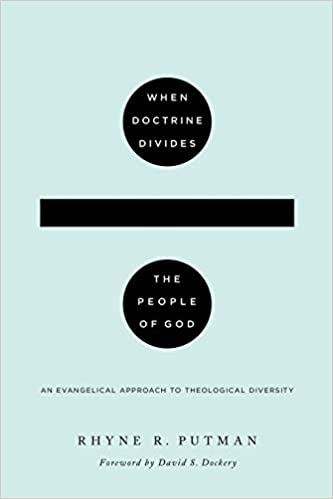Mini Book Review #15: When Doctrine Divides the People of God: An Evangelical Approach to Theological Diversity, by Rhyne R. Putnam.
This review is longer than most of these “mini” reviews. I felt it was a necessary read in these days of so much division and infighting within the church.
“In essentials unity, in nonessentials liberty, in all things charity.”
(Adage quoted by Putman.)
Putman begins his book with a scholarly discussion of the different ways we approach Scripture. He explains the modernist view (we “create” meaning each time we read a text) but defends the view that God, as author of the Bible, has one meaning that He has expressed clearly. We don’t understand perfectly (just like we aren’t fully sanctified immediately after salvation), but over time, God reveals truth to us. Putman points out that it’s our own imperfect reading of Scripture that causes doctrinal disputes, not an imperfection of Scripture itself.

The first half of the book is difficult reading for the layman. (I felt like I was back in college, trying to focus my attention on his numerous definitions.) The second half, however, I found greatly helpful. Putman uses Wesley and Whitefield as examples of unity (following Iaian Murray’s research in Heroes), and he gives tips for when and how to disagree with fellow believers in love and humility, seeking first to understand and then to be understood.
Also, Putnam says that one thing to consider when you disagree with someone, in addition to his amount of expertise compared to yours, is this:
“Does the person with whom I disagree exhibit the fruit of the Spirit?…Paul asserts that a lack of virtue can be a good indicator of false teaching.” I Tim. 6:3-4
Rhyne Putnam, When Doctrine Divides (p. 197).
Illuminating Quotes from When Doctrine Divides:
“Unity without truth is no actual unity at all because it is devoid of a common purpose.”
Rhyne Putnam, page 26 of When Doctrine Divides.
“We can fight false teaching without being contentious, and we can be peacemakers without waving the white flag in the surrender of our biblical convictions. Christian unity is a good, valuable thing to pursue, but not at the expense of essential truth. Unlike the spirit of theological minimalism that permeates so much of the ecumenical conversation, the discussion of doctrinal disagreement in this book celebrates both doctrine and difference.”
Rhyne Putnam
“The illumination of the Holy Spirit is what separates the reading of the uneducated believer who is convinced of her sin and her need for Jesus from the reading of the skeptical scholar who understands the language, composition, and historical background of the text but does not see how the text or its message fits into his own life.”
Rhyne Putnam, p. 62.
“Confirmation bias in biblical studies and theology has to do with the way someone unwittingly uses and selects the evidence that confirms his or her previously held belief or working hypothesis.” (156) We all approach texts with our own biases, whether we realize it or not. Liberal Protestants see patterns of a liberal Protestant Jesus in the text, feminists a feminist Jesus, social justice warriors another social justice warrior, and fundamentalists a fellow fundamentalist… As Sola Scripture Christians, our primary goal is to understand the theological content of Scripture, not defend our respective theological traditions.”
Putnam, p. 161-2.
“…those who recognize biblical authority must call into question their interpretive desires and place themselves under the meaning of the text, even if that takes them to a place with which they are uncomfortable. This interpretive disposition is the hermeneutics of submission.”
Putnam, p. 166.
Quotes on Disagreement:
“Disagreement reminds us of our own imperfections as interpreters and our need for ongoing growth and development. We should prayerfully, patiently, and humbly wade through the theological disagreements we have with one another. On occasion, this means changing our minds, while on other occasions it means remaining steadfast in our belief or suspending our judgment on a matter.”
Putnam, p. 200.
“Some Christians seem to believe the only choice they have in these controversies is to give up their convictions or be contentious bullies. Neither is a biblically faithful option. We must be able to correct doctrinal error when we see it, challenge misconceptions where they lie, and do so in a way that seeks the ultimate restoration and reconciliation of our opponents.”
Putnam, p. 251.
Calling for Comments on When Doctrine Divides
What are your thoughts? How can we disagree in a spirit of charity? Ought we to allow division for the sake of truth? Let us know in the comments below.
